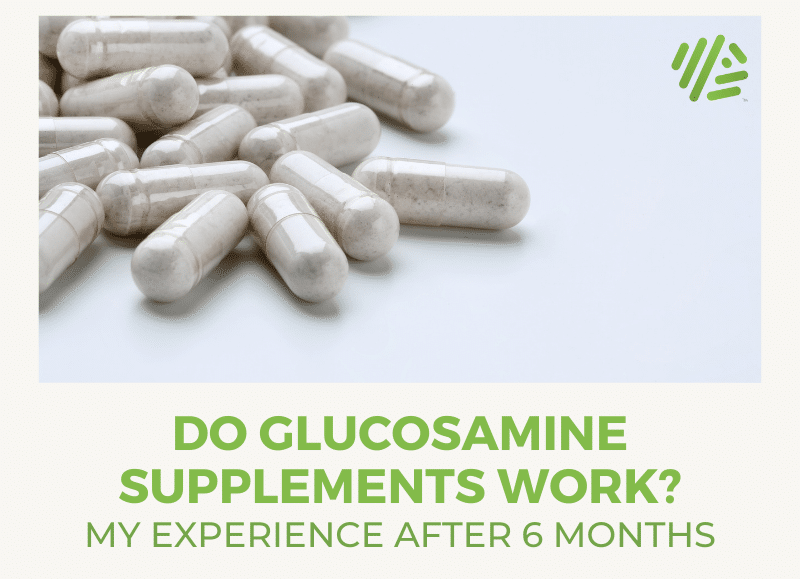Do Glucosamine Supplements Have Real Benefits? My Experience After 6 months
Article at a Glance
- Glucosamine sulfate isn’t usually found on its own as a supplement. It’s frequently paired with at least one of the following: chondroitin sulfate (helps cartilage retain water), MSM (stands for methylsulfonylmethane, which aids in collagen production), or shark cartilage.
- Glucosamine is “likely effective” at giving some relief for osteoarthritis, particularly for the knees, and it might slow the breakdown of joints.
- There is “insufficient evidence” on other claims of glucosamine sulfate helping with the following issues: joint pain caused by drugs that lower estrogen levels, painful bladder syndrome, joint stiffness/function as it relates to joint pain or knee pain (though improved knee movement has been found), multiple sclerosis, jaw pain, glaucoma, and weight loss.

Contents
Glucosamine supplements have long been the talk of the running community. I’ve gone on and off of glucosamine and chondroitin supplements over the past six years I’ve been a runner … much like I’ve gone on and off of running. Since I was attempting to more seriously lace back up my running shoes after the New Year, I thought I’d also work on figuring out whether or not glucosamine supplements have proven benefits. If you are considering a glucosamine supplement, either to aid in running recovery or to help with arthritis or other joint pain, this post may be for you. We also wrote a post on supplements for runners that some of you may find interesting. What is glucosamine? The term “glucosamine” most often refers to glucosamine sulfate, which is a naturally occurring sugar found in the fluid around our joints which helps build cartilage, ligaments, and tendons. Glucosamine supplements are usually shellfish derived.
People take glucosamine supplements for a variety of ailments, including joint pain around the knees, back pain, osteoarthritis, glaucoma, and multiple sclerosis. Those with osteoarthritis, for example, have cartilage that has broken down or thinned, so a supplement that encourages cartilage production — particularly with sulfate, which is needed for this very activity — may be helpful. Although the usefulness of glucosamine continues to be debated, it is at least as effective or more effective than non-steroidal anti-inflammatory drugs with generally little in the way of side effects. The amount of pain relief also may depend on just how bad your joint pain is in the first place, which may be a contributing factor in inconclusive or conflicting study results on the effectiveness of glucosamine supplements.1 As we will see, generally speaking, those with elevated pain tend to gain the greatest benefits from glucosamine.2
Glucosamine double-blind study
Glucosamine sulfate isn’t usually found on its own as a supplement. It’s frequently paired with at least one of the following: chondroitin sulfate (helps cartilage retain water), MSM (stands for methylsulfonylmethane, which aids in collagen production), or shark cartilage. Although some think these combinations are what makes glucosamine supplements work their magic, researchers have found minimal or no benefits to blended glucosamine formulas over and above glucosamine as a stand alone supplement. A $12.5 million study conducted at 16 U.S. rheumatology research centers called the “Glucosamine/chondroitin Arthritis Intervention Trial” (GAIT) was the first large-scale research done on the effectiveness of glucosamine and chondroitin for knee osteoarthritis pain — although it tested glucosamine hydrochloride rather than glucosamine sulfate. The double-blind study measured use of glucosamine/chondroitin supplements over 6 months and compared it to a prescription drug used to manage knee pain as well as a placebo, in addition to the supplements being measured separately. Those with moderate to severe pain responded best to the glucosamine/chondroitin combination — 79% had a 20% or greater reduction in pain compared to the placebo, as opposed to 70% of those taking the arthritis drug versus the placebo. Those with mild pain felt no statistically significant pain relief from any glucosamine or chondroitin supplementation.3
The case for glucosamine in healthy adults
Are there other studies that back up these results? The big question! While the GAIT research showed us that these supplements helped some of the 1,583 study participants (who were over age 40 and had documented osteoarthritis), do glucosamine supplements work in otherwise healthy people? According to the Natural Medicines Comprehensive Database, which ranks the effectiveness of supplements based on scientific evidence, glucosamine sulfate can be considered beneficial for some people. Generally, it is “likely effective” at giving some relief for osteoarthritis, particularly for the knees, and it might slow the breakdown of joints — if taken over several years.3 The most effective products are those with glucosamine sulfate. Note that the GAIT research used glucosamine hydrochloride, which has been shown to not work as well as sulfate. However, there is “insufficient evidence,” per the database, on other claims of glucosamine sulfate helping with the following issues: joint pain caused by drugs that lower estrogen levels, painful bladder syndrome, joint stiffness/function as it relates to joint pain or knee pain (though improved knee movement has been found), multiple sclerosis, jaw pain, glaucoma, and weight loss. Our “industry insider” at Gene Food says the GAIT research was a landmark trial.
“I think it is safe to say the usefulness of glucosamine/chondroitin containing supplements is one of the most debated topics in our industry. When you look at the literature, it’s all over the place. Some find it very effective and some find it completely useless.”
There is a large variance in the literature, probably because of the sourcing of raw materials and the manufacturing process. Chondroitin is expensive as a raw material and is often watered down, while sub-therapeutic dosing and cheap manufacturing techniques like acid hydrolysis yield inconsistent particle sizes that are typically too large to be readily absorbed. In the GAIT trial, raw material was enzymatically processed to provide a consistently small and well-absorbed particle size.
How much glucosamine should I take?
Speak with your doctor.
Our insider says the aim for daily supplementation should be 1,500 mg glucosamine along with 800 mg chondroitin of a raw material. Results will take a few weeks, with the best results seen after six weeks.
“My thought on the supplement and market, as a whole, is that people can absolutely benefit from the combination but expectations have to be set appropriately and products have to be thoroughly vetted to ensure raw material selection and dosing.”
Glucosamine supplement side effects
While glucosamine may or may not beneficial, it is low risk. Glucosamine sulfate is considered safe when taken orally as a supplement, but some people take injections — these are considered “possibly safe.” Glucosamine can interact with some other medications, including Coumadin (a blood thinner, also known as Warfarin) and some cancer drugs. Those will shellfish allergies, high blood pressure, high cholesterol, diabetes, or asthma should be cautious when taking glucosamine supplements.4 There have been few studies on chondroitin — some of which have shown moderate to large benefits for patients with osteoarthritis, while others have found none.56 It’s usually made from shark or cow cartilage, so those with shellfish allergies may have fewer risks, but chondroiton sulfate has some of the same warning groups as glucosamine (folks who take blood thinners, for example), in addition to precautions if you or a family member has prostate cancer.
How I felt taking glucosamine supplements
OK, so full disclosure: I do not have osteoarthritis. When I bought glucosamine supplements about six months ago, it felt like I was just going along with the herd mentality of glucosamine being good for runners, similar to how people say fish oil is good for us, too (John tends to disagree, depending on the fish oil). In addition to glucosamine, I do also currently take a fish oil supplement, magnesium, vitamin D, and occasionally vitamin C.
The brand of glucosamine sulfate I’ve been taking is this Glucosamine Chondroitin, MSM & Turmeric Dietary Supplement by VitaBreeze. Two capsules twice a day provide 1,500 mg glucosamine sulfate, 1,000 mg chondroitin sulfate, 600 mg MSM and 300 mg Turmeric. I typically only take one serving daily, just because four pills total at two meal times is difficult to remember for me. (Our supplement insider, meanwhile, recommends taking pharmaceutical-grade chondroiton sulfate, like Ortho Molecular Chondro-Flx.)
I’ve felt good overall taking glucosamine the past few months, though I’ve been having a hard time pinpointing if this is due to better running techniques, strength training, or other supplementation. But I went a few days without glucosamine — and also forgot to take my magnesium — and proceeded with two hilly and fast 4-mile runs mid-week about halfway through my race training a month ago. After the second run, I was pretty sore the next day, which was unusual. Was this because of missing the glucosamine, or the magnesium? Or both? I’ve regretted not separating the two, but it feels like both are good for me to be taking right now. A few notable effects of my supplement and race-training regimen, compared to how I’ve trained for previous races without glucosamine:
- I don’t have daily pain in my knees, more like irritation, so glucosamine may not be intended for me. Although my regular cracking and popping in my knees hasn’t subsided with glucosamine, my knees have generally been less sore after runs than they were before I was taking glucosamine while running.
- Walking up and down stairs has been less of a challenge in terms of discomfort, which I noticed mostly on the days I didn’t take glucosamine. In the hours after my longest run of the week (10-plus miles), I’d usually feel actual knee pain using the stairs in my apartment or at work back when I was running more regularly a few years ago. This time, I’ve got little to no pain after those runs, most notably when taking the stairs.
- While I was starting up glucosamine supplements again, I decided to go without alcohol for a month to amp up the kickoff to my training for a half marathon. While this might have been an effect of other lifestyle changes and not necessarily the supplements, my massage therapist noticed that my body had a lot less inflammation during my last appointment than I had the previous two or three months (which was right in the thick of holiday hangover season). This is notable though, when considering the research that glucosamine may be more effective than NSAIDs, which I generally try to avoid.
Although I don’t have any significant joint issues, given the fact that glucosamine sulfate is relatively safe and I also don’t have any underlying conditions or allergies, I plan to continue taking it. Hopefully I’ll keep feeling strong while running — and while recovering from running!



Tylenol is not an NSAID.